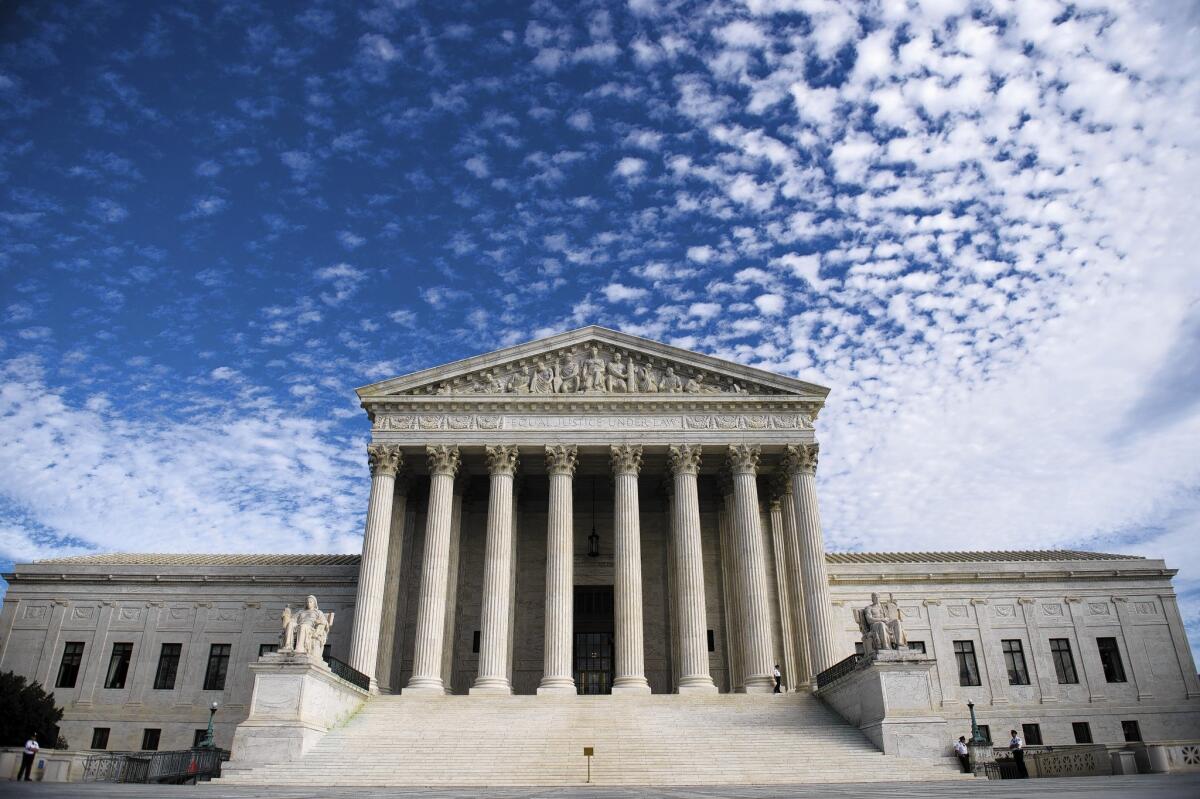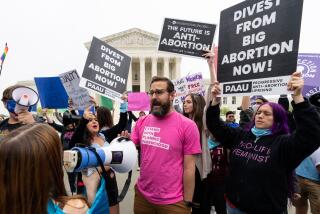Compromise remains elusive on health law’s contraceptive coverage

WASHINGTON — The intensifying Supreme Court clash over whether birth control should be required under President Obama’s signature healthcare law has revealed just how deep divisions remain between administration officials and Catholic leaders over where to draw the line between religious freedom and women’s reproductive rights.
After more than two years of negotiations, a compromise that satisfies everyone appears out of reach, likely leaving the matter for high court justices to decide later this year. Obama administration officials and Catholic bishops are so far apart they don’t even agree on what rests at the heart of the debate.
The administration views it as a matter of public heath and equal rights, calling for most new healthcare policies sold in the U.S. to include coverage for contraception. They exempted churches and other houses of worship, and later tried to shield Catholic hospitals, schools and other nonprofit religious organizations that object to birth control from being forced to directly fund such benefits.
PHOTOS: The battle over Obamacare
Instead, such groups can sign a form stating that they have a religious objection, and the government would require insurers to pick up the cost. It’s a minor inconvenience, administration officials say, to ensure American women receive a basic package of health benefits.
Some prominent Catholic groups accepted that proposal, but others, including a group of Colorado nuns who took their complaint to the Supreme Court on Tuesday, say that even signing such a form would make them complicit in providing contraceptive devices to women in violation of church teachings. At stake, they say, is the very core of their religious freedom.
The dispute sets the stage for the Supreme Court to decide a second major case involving a claim of religious freedom and the president’s healthcare law, which took full effect Wednesday.
Already, the justices had agreed to decide this spring whether private, profit-making companies can be required to provide contraceptives as part of their health insurance. The Christian family that owns the Hobby Lobby chain of arts and crafts stores is challenging that requirement.
As early as Friday, the justices will start to consider whether to hear a case or cases involving Catholic charities, including the Little Sisters of the Poor, a Roman Catholic community with centers in Denver and Baltimore.
The Obama administration has labored to allay the concerns of religiously affiliated hospitals, charities and universities since Congress passed the Affordable Care Act in 2010.
The administration initially argued that all American employees should have a right to basic preventive care at no cost, including Food and Drug Administration-approved contraceptives, such as birth control pills and “morning after” pills.
When the U.S. Conference of Catholic Bishops objected, the administration agreed to exempt churches and houses of worship from the requirement. It also agreed to distance Catholic hospitals, schools and other nonprofit religious organizations from paying for contraceptives, though the administration insisted that birth control still be made available by their insurers.
PHOTOS: 2013’s memorable political moments
“Thus, there is no burden on any religious exercise of the eligible organization,” the government said in its July 2 regulation.
The administration’s compromise was applauded by public health groups and women’s rights advocates who have strongly supported the healthcare law’s requirement of contraceptive coverage for women.
The proposal also drew support from the Catholic Healthcare Assn., an influential medical group that represents the nation’s Catholic hospitals.
Similar mandates requiring contraceptive coverage have been on the books in states for years, with laws or regulations in more than 20 states that resemble, at least in part, the federal requirement under the Affordable Care Act, according to a review of states’ records.
The Obama administration’s complex system for shielding employers from paying for contraceptive coverage has not quelled criticism from all religious groups. Several bishops and universities sued in federal courts across the country arguing their rights to religious freedom were violated by a rule that forced them to authorize payments for contraceptives they found morally objectionable.
Some judges agreed to put the regulation on hold for them while their legal case was heard. Others refused. On New Year’s Eve, lawyers from four regional circuits filed emergency appeals with the Supreme Court, asking justices to give them a temporary shield when the new regulation took effect at midnight.
Otherwise, “numerous Catholic organizations [will face] draconian fines unless they abandon their religious convictions and take actions that facilitate access to abortion-inducing drugs, contraceptives and sterilization for their employees and students,” lawyers for the Archbishop of Washington wrote in one of the appeals.
Several lower courts granted the last-minute appeals, and Justice Sonia Sotomayor issued a temporary stay to shield the Little Sisters of the Poor. She told the government’s lawyers to file a response by Friday morning.
Mark Rienzi, a Catholic University law professor who filed the appeal on behalf of the Little Sisters of the Poor, said even the act of requesting a formal exemption could be seen as granting a kind of “permission form” because it triggers the requirement that insurers step in to offer contraceptive coverage.
But University of Virginia law professor Douglas Laycock, a leading expert on religious liberty, said he was not convinced that the Little Sisters of the Poor had a strong claim.
“The question is whether it’s a substantial burden under the free exercise [of religion] clause,” he said. “This doesn’t look very substantial to me.’”
Laycock said he doubted the justices would vote to hear the case next week.
Timothy M. Phelps in the Washington bureau contributed to this report.
More to Read
Sign up for Essential California
The most important California stories and recommendations in your inbox every morning.
You may occasionally receive promotional content from the Los Angeles Times.











